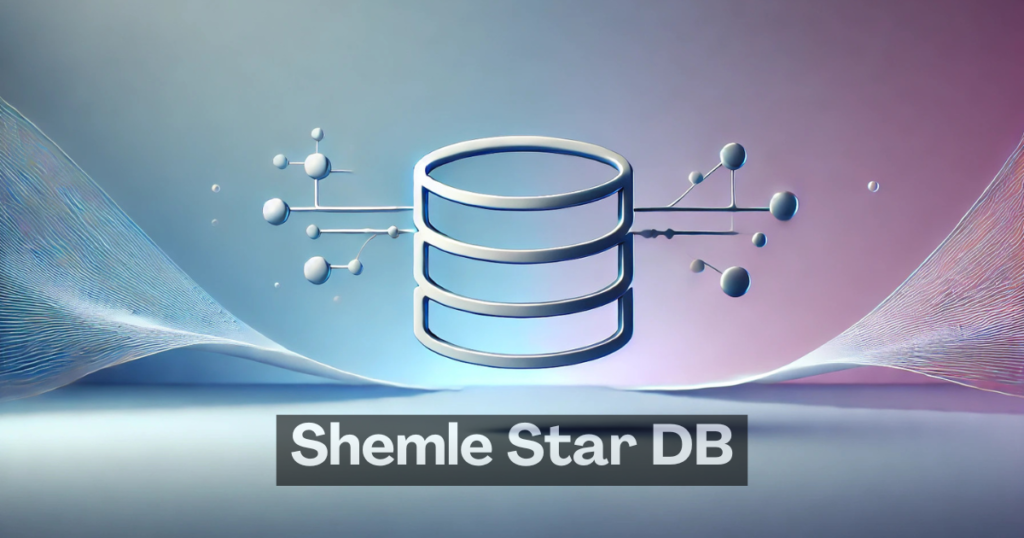In the ever-evolving world of data management, Shemle Star DB stands out as an innovative player that has garnered attention for its powerful features and unique architecture. This database solution, known for its performance, scalability, and versatility, has emerged as a strong contender among modern database systems. In this article, we’ll dive into what makes Shemle Star DB unique, its core features, and how it stacks up against other database management systems.
1. Introduction to Shemle Star DB
Shemle Star DB is designed to handle large volumes of data with high efficiency, a feature highly sought after in industries such as finance, healthcare, and e-commerce where data growth is exponential. This database system is structured to be adaptable and scalable, allowing organizations to manage data both in the cloud and on-premises seamlessly.
2. Core Features of Shemle Star DB
- High Performance: Known for its rapid query processing, Shemle Star DB can execute complex transactions at high speed, thanks to its optimized indexing and memory management.
- Scalability: Shemle Star DB is built to grow alongside an organization’s needs. It supports horizontal scaling, making it easy to expand data storage capabilities without significant downtime.
- Flexibility in Data Models: Unlike traditional relational databases, Shemle Star DB offers a hybrid approach that allows for both SQL and NoSQL capabilities, making it suitable for diverse data types and structures.
- Advanced Security Features: With the increasing concern over data privacy and security, Shemle Star DB incorporates advanced encryption, user authentication, and access control mechanisms to safeguard sensitive information.
3. Technical Architecture
Shemle Star DB employs a multi-tiered architecture that separates storage, processing, and application layers, enhancing overall system performance and reducing bottlenecks. This design enables Shemle Star DB to provide a high level of reliability and flexibility. It also allows for the integration of machine learning models, which are increasingly used to derive insights from data.
4. Use Cases for Shemle Star DB
Shemle Star DB is versatile enough to serve in various applications across different sectors:
- Finance: In the financial sector, where transaction speed and accuracy are crucial, Shemle Star DB supports real-time processing for trading platforms, payment gateways, and fraud detection systems.
- Healthcare: Medical facilities and research institutions rely on Shemle Star DB to handle large sets of patient data, enabling efficient management and retrieval of electronic health records.
- E-commerce: The ability to scale and process large volumes of data makes Shemle Star DB ideal for e-commerce platforms that require rapid response times and data consistency.
5. Shemle Star DB vs. Traditional Databases
Compared to traditional relational databases like MySQL and Oracle, Shemle Star DB offers greater flexibility in handling unstructured data, a critical need in the age of big data. Its ability to seamlessly manage both SQL and NoSQL workloads provides organizations the benefit of a hybrid solution without needing to maintain separate systems.
Additionally, Shemle Star DB’s advanced indexing and storage techniques make it more efficient for real-time data analysis than many conventional databases.
6. The Future of Shemle Star DB
The future looks promising for Shemle Star DB as more businesses shift to hybrid and cloud-native database solutions. With its ongoing development to incorporate AI and machine learning capabilities, Shemle Star DB is expected to lead innovations in database technology, particularly in data-intensive fields.
Conclusion
Shemle Star DB is reshaping how businesses manage, process, and secure their data. As organizations continue to demand faster, more flexible, and scalable solutions, Shemle Star DB is well-positioned to become a significant player in the industry. Whether for large enterprises or growing startups, this database system provides the tools to handle today’s data challenges and prepares for the complexities of tomorrow.
FAQs
1. What is Shemle Star DB?
Shemle Star DB is a high-performance, scalable database management system designed to handle large volumes of data with flexibility and efficiency. It supports both SQL and NoSQL data models, allowing it to manage structured and unstructured data.
2. How does Shemle Star DB differ from traditional databases?
Shemle Star DB offers a hybrid approach by supporting both SQL and NoSQL functionalities, which is different from traditional relational databases like MySQL or Oracle. This flexibility allows Shemle Star DB to manage diverse data types and handle real-time analysis and big data applications effectively.
3. What are the primary features of Shemle Star DB?
Key features of Shemle Star DB include:
- High-speed query processing
- Scalability with horizontal scaling support
- Hybrid SQL and NoSQL functionality
- Advanced data encryption and security measures
- Compatibility with cloud and on-premises environments
4. Which industries can benefit from using Shemle Star DB?
Shemle Star DB is versatile and can be applied across various industries, including finance, healthcare, retail, e-commerce, and logistics. Its ability to handle large datasets makes it suitable for sectors that require fast data processing and analysis.
5. How does Shemle Star DB handle data security?
Shemle Star DB employs advanced security features, including data encryption, multi-factor authentication, and access control to protect sensitive information. These measures help ensure that data remains secure from unauthorized access.
6. Can Shemle Star DB integrate with cloud services?
Yes, Shemle Star DB is designed to work seamlessly in both cloud and on-premises environments, allowing businesses to scale their databases and manage data storage flexibly. It is compatible with major cloud service providers, enabling easy integration for cloud-native applications.
7. What data models does Shemle Star DB support?
Shemle Star DB supports both relational (SQL) and non-relational (NoSQL) data models. This flexibility allows users to store structured data in relational tables and unstructured data in document-based formats within the same system.
8. Is Shemle Star DB suitable for real-time data processing?
Yes, Shemle Star DB is optimized for high-speed query processing, making it ideal for real-time applications where data needs to be processed quickly. This feature is particularly beneficial for industries like finance and e-commerce, where rapid transactions and responses are crucial.
9. What are the storage options with Shemle Star DB
Shemle Star DB offers flexible storage options, including support for both on-premises storage and cloud-based storage. Users can choose the storage solution that best suits their data management needs and scalability requirements.
10. How does Shemle Star DB handle scalability?
Shemle Star DB supports horizontal scaling, which allows businesses to add more nodes to the database cluster as data demands grow. This design enables Shemle Star DB to handle increasing data volumes without compromising performance.
11. What makes Shemle Star DB suitable for machine learning applications?
Shemle Star DB’s architecture supports fast data retrieval and processing, making it well-suited for machine learning and AI workloads. By integrating machine learning models directly into the database, Shemle Star DB can help organizations derive insights from data more efficiently.
12. Is there a community or support network for Shemle Star DB users?
Yes, Shemle Star DB has a growing community of users and developers who share knowledge, troubleshooting tips, and best practices. Additionally, the Shemle Star DB team offers support options for organizations seeking more direct assistance.
13. How does Shemle Star DB handle backups and disaster recovery?
Shemle Star DB includes robust backup and recovery options to ensure data integrity. The system allows for automated backups and offers replication features that help protect data in case of system failures or other disruptions.
14. What licensing options are available for Shemle Star DB?
Shemle Star DB offers flexible licensing options, including open-source and enterprise editions. These options allow organizations to select the licensing model that best meets their needs based on budget and scale.











